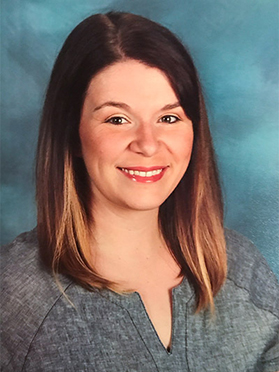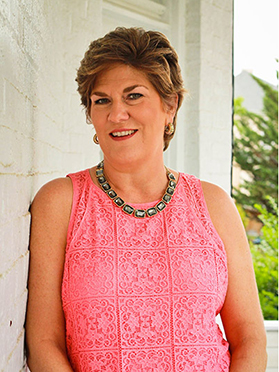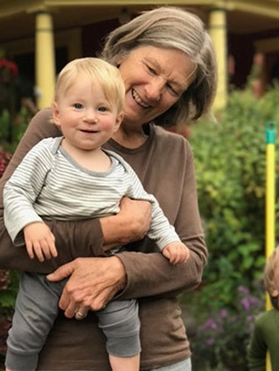
Julian Turner
Substance Abuse Counselor, Harrisonburg, VA: "There is not a day that passes in my profession, and often personal life that does not connect back to lessons and techniques gleaned from the counseling program."
Graduates of EMU's Graduate Counseling Program are high achievers who are sought after by regional employers.
The Graduate Counseling Program had a total of 14 graduates in 2024. Students are expected to complete the program in four years or less, and the 2020-2024 cohort had a 77.78% completion rate. The most current data from the Virginia Board of Counseling shows that EMU MA in Clinical Mental Health Counseling graduates who have taken their licensure exam in Virginia have a pass rate of 80%, as compared to the 60% overall pass rate. 76.9% of the 2023 graduates who were seeking employment in counseling secured jobs within three months of graduation, and 100% secured jobs within nine months.
Learn about licensure procedure in Virginia
Learn about licensure in other states
Upon graduation, a majority of our alumni pursue licensure and register for the 3,400 hour (including 2,000 direct hours) residency required by the Virginia Board of Counseling. Following completion of residency hours, residents must be approved by the Virginia Board of Counseling to sit for the National Clinical Mental Health Counseling Examination.
Approximately 40 students are enrolled in the program on a yearly basis. We also accommodate students who are working professionals and need to extend their coursework/training. About half of our students complete the program in two years, including a summer session, and the other half complete the program in three years, including a summer session. Students in either track are considered full-time students.

EMU’s Graduate Counseling Program is accredited in Clinical Mental Health Counseling
by the Council for Accreditation of Counseling and Related Educational Programs (CACREP). Students graduating with a CACREP-accredited degree can more often easily achieve state counseling licensure and experience
greater ease of license portability between state licensing boards. Students with
CACREP-accredited counseling degrees are often considered exceptional candidates for doctoral
programs.
For more information about the counseling profession, contact the American Counseling Association.
Substance Abuse Counselor, Harrisonburg, VA: "There is not a day that passes in my profession, and often personal life that does
not connect back to lessons and techniques gleaned from the counseling program."
Middle School Counselor, Page County Public Schools, VA: "The MAC program was much more than an education; it was an opportunity for me to
dig deeper into myself and the world around me."
Individual and Couples Psychotherapist, Dana Blauch PLC, Harrisonburg, Va.: A broad exposure to current research and theories allowed me to explore how I might
best integrate my personal style with solid research based practice.
Youth Counseling Program Manager, ReadyKids, Charlottesville, VA: "Through this program I came to understand more about myself and how I view the world
around me which has enabled me to create the space needed to help others."
Springwater Environmental Science School, Oregon City, OR: "My grad school years were such a formative time professionally and personally, and
taught me to listen hard, particularly for what is NOT said."
Alumni Reviews

Julian Turner

Casey Owens

Dana Blauch

Shannon Noe

Marjorie Nafziger
Program assessment and evaluation begins with clear program objectives, against which the activities within the program can be compared. Thus the activities of evaluation are as diverse as program content and process, and the persons who can engage in productive evaluation are equally diverse.
Evaluation tends to focus in two directions: evaluation of individual student progress toward counselor competencies and internalized identity, and evaluation of program success in meeting its stated mission and goals.
The most important groups engaging in program evaluation are the current students and graduates, the faculty and staff, the university’s institutional effectiveness administrators, and the program accrediting bodies.
A clear mission that grounds program goals and student outcome objectives, and the assessment of success in achieving goals and objectives should engage all stakeholders in important identity conversations, strategic planning, curriculum planning, and evaluation of effectiveness.
A healthy counselor education program is a dynamic, evolving system that lives within larger institutional, disciplinary and professional, and cultural contexts.
The EMU Graduate Counseling Diversity, Equity, Inclusion, and Belonging (DEIB) Plan is reviewed for progress, completion, and improvement at EMU graduate counseling department retreats in May and August each year. Changes are noted in the annual evaluation report (see table below) and a revised and approved DEIB plan is created for the following academic year. Broader university DEIB resources can be found on the EMU DEI website.
Read the current EMU Graduate Counseling DEIB Plan
The EMU graduate counseling program strives to accomplish 6 overarching program objectives to maintain a high quality training program through continuous and systematic program evaluation. Those program objectives are as follows:
The table below contains various evaluation results from 2016 through 2022, separated
by evaluation type. In 2023, we decided to instead publish a comprehensive annual
evaluation report. The annual evaluation reports include that year's survey results,
faculty evaluations of competency assignments, updates on major program modifications,
and more.
Please click on the following links for publically available program evaluation information.
| Program evaluation report item | Publically available data |
| Annual Evaluation Report | |
| Programmatic actions in response to survey feedback | |
| Annual Competency Assignment Evaluation reports | Academic years 2018-2022 |
| Survey aggregated results (20216-2021) | Alumni, Supervisors, Employers |